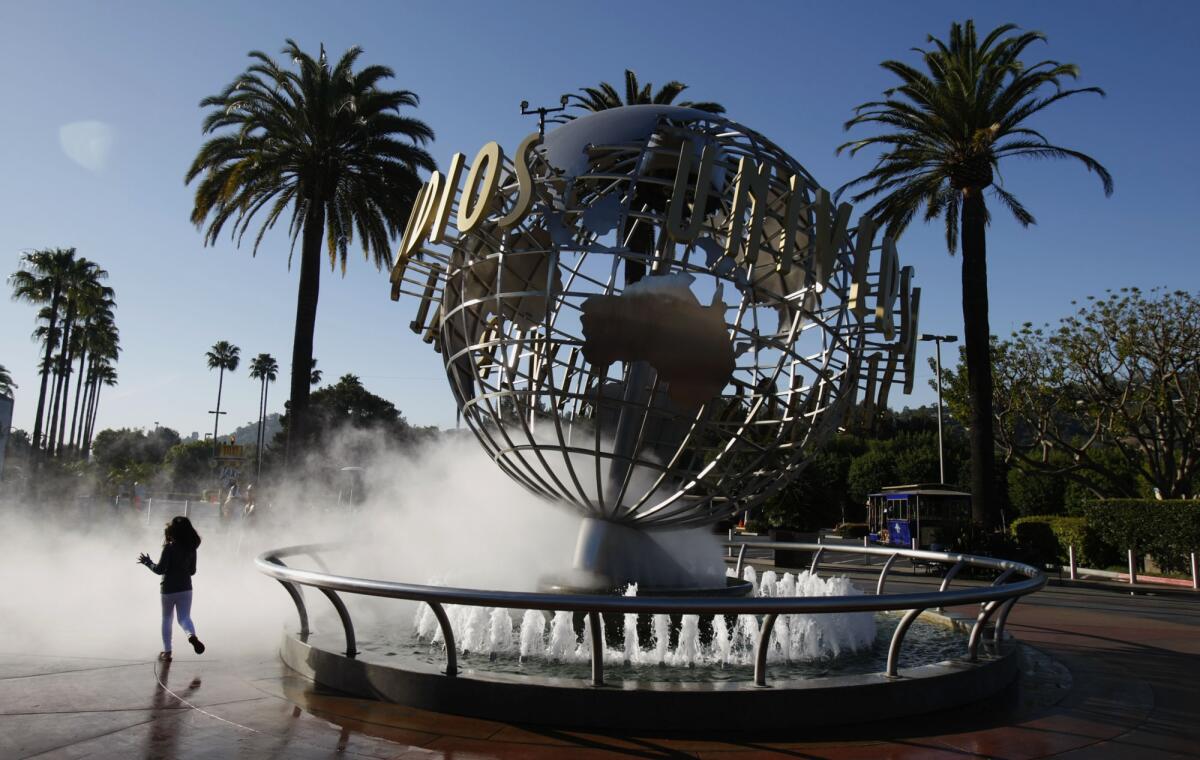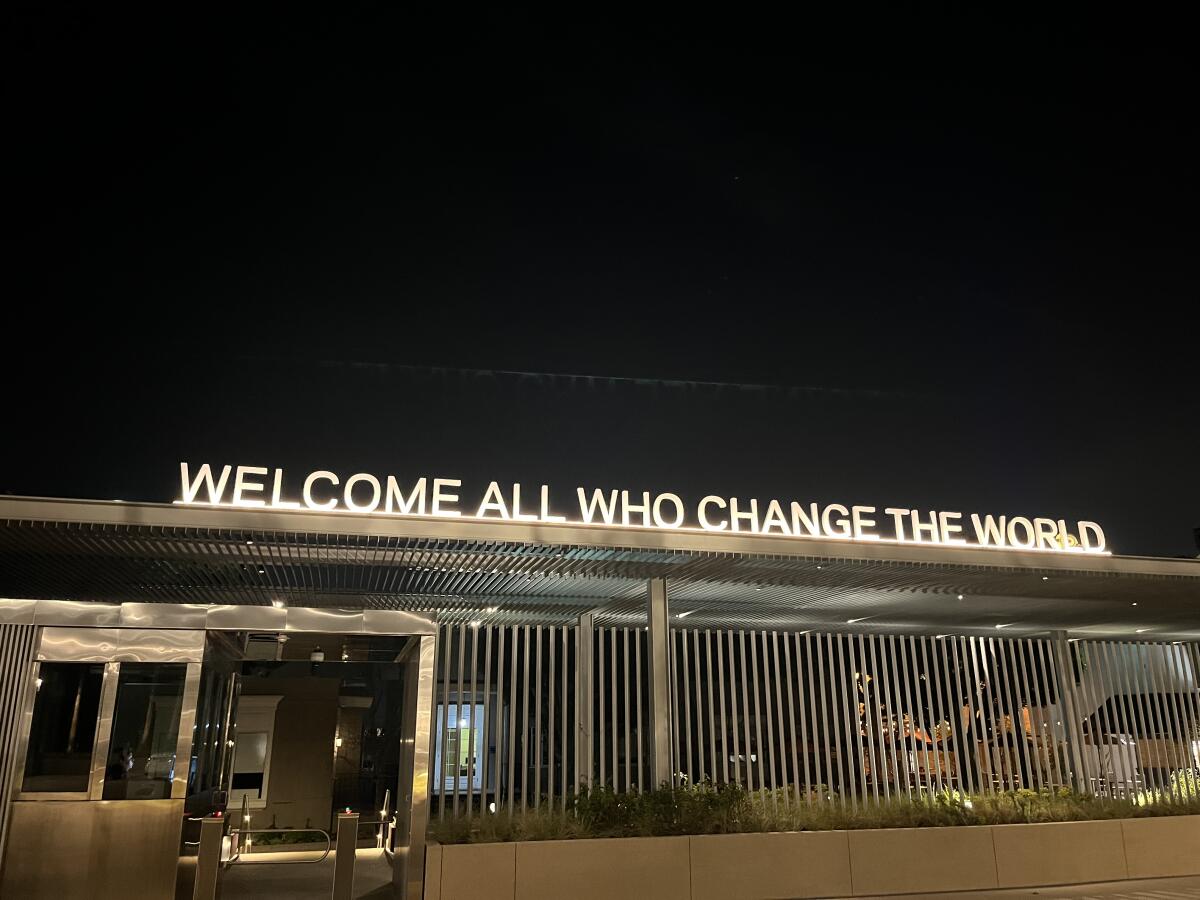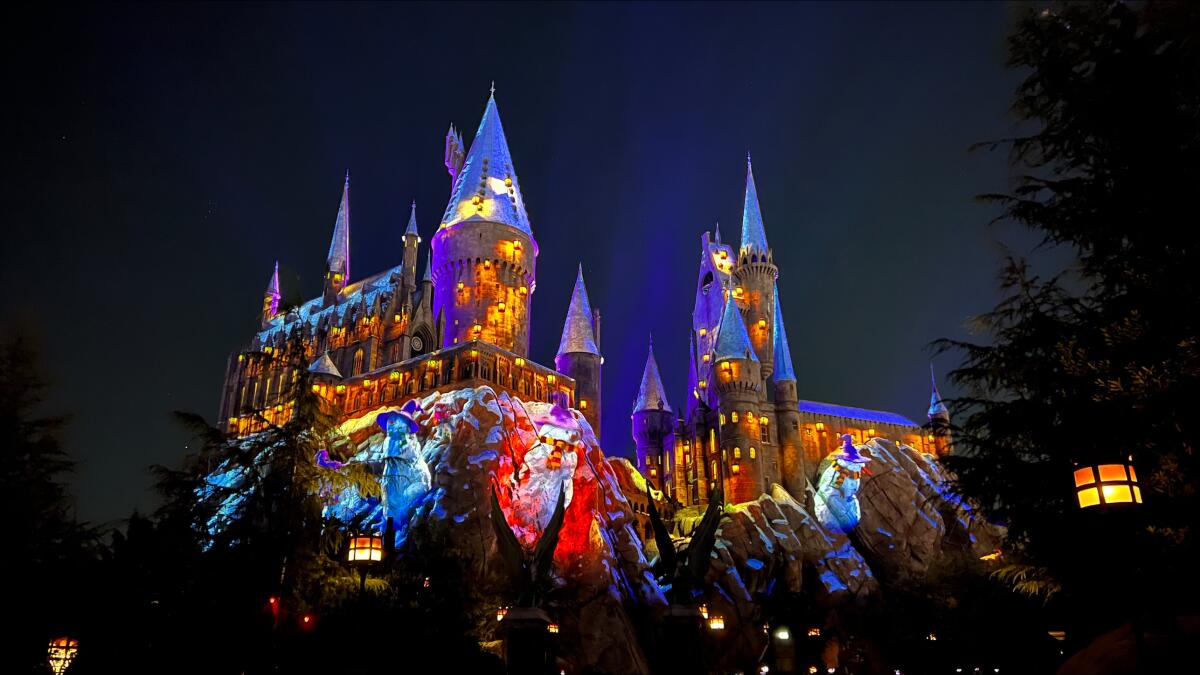Column: Meet the writers pitching Hollywood studios on climate change stories

- Share via
Nicole Conlan writes jokes for Jon Stewart on “The Daily Show.” But her master’s in urban planning from USC and her experiences growing up in Colorado surrounded by skiers were just as relevant to her task on the Universal Studios lot last week.
The Emmy-nominated writer had 10 minutes to pitch a studio executive on her half-hour climate change sitcom. She described it as similar to “Curb Your Enthusiasm” and “It’s Always Sunny in Philadelphia,” only set at a Colorado environmental group, poking fun at a character who gets involved in climate advocacy for selfish reasons and must slowly learn to care.
“Just a quick disclaimer: I named the character Nicole because I wanted to write the worst possible version of myself. But I’m not planning on acting in it. I would like somebody famous to be in my television show,” Conlan told the studio executive.
“The starting point for a lot of these episodes is in the climate space and the environmental world, but it really is a show about the characters and their interactions,” she added. “Kind of the same way ‘Parks and Rec’ is a show about local government, but it’s not really a show about local government. Or ‘Always Sunny’ is about running a bar, but it’s not really about running a bar.”
Conlan was one of 18 writers on the NBCUniversal campus — which hugs the Los Angeles River, within sight of Universal Studios Hollywood’s Hogwarts castle — for a climate change “pitchfest” organized by the Hollywood Climate Summit.
It was the group’s second such event, and the latest sign of a growing movement within the entertainment industry to tell stories that reflect reality — that is, stories about a world reshaped by rising temperatures, and a world it’s not too late to save.
You're reading Boiling Point
Sammy Roth gets you up to speed on climate change, energy and the environment. Sign up to get it in your inbox twice a week.
You may occasionally receive promotional content from the Los Angeles Times.
The Hollywood Climate Summit received 125 film scripts and TV pilots when it put out a call for submissions last year. The group and its advisors chose 51 semifinalists, evaluating entries based on the strength of the stories, the diversity of the characters and the attention paid to climate — although global warming didn’t have to be the explicit focus.
“We were hoping for scripts that addressed what we see as aspirational values in the age of climate,” said Heather Fipps, one of the summit’s co-founders. “This could be Indigenous LandBack stories. This could be ocean conservation. We’re looking for things that are not just apocalyptic or eco-terrorism-focused. We want to avoid the tropes of what we consider a climate story.”
Then a jury of entertainment industry veterans — some well-versed in climate, others new to this kind of storytelling — picked the finalist screenwriters, many of whom made it to the Universal Studios lot to pitch their stories to development executives.
“We did not have a hard time getting interest in the development executives coming. So that’s a good sign,” Fipps told me.
So far, there definitely aren’t enough references to the climate crisis on our screens.
When USC researchers analyzed 37,453 scripted television episodes and films released from 2016 through 2020, they found that just 2.8% mentioned climate change (or a long list of related terms). More recently, a consulting firm and an academic developed the Climate Reality Check, a test to determine whether a film or TV show acknowledges global warming. Of the 13 feature-length, fictional Oscar-nominated movies this year set in present-day or near-future Earth, just three passed the test.
Why does it matter whether Hollywood tells stories about the climate crisis?
Because for better or worse, the entertainment we consume can shape how we understand and interact with the world.

Researchers have found, for instance, that the beloved sitcom “Will & Grace” helped reduce prejudice against gay men. There’s also a long history of research suggesting that watching violence on screen can lead to increased risk of violent behavior.
So it’s encouraging to see screenwriters and producers coming together to talk climate — especially when the biggest barriers to avoiding a future of ever-deadlier heat waves, wildfires and hurricanes aren’t technological or economic, but rather political.
As the Yale Program on Climate Change Communication reported last week, there’s a huge “attitude-behavior gap” on climate in the United States. Lots of Americans say they would engage in political action on climate if someone they liked or respected asked them to — by signing a petition or donating money to an advocacy group or volunteering or contacting government officials — but few of them are actually doing so. They’re concerned about global warming but not doing much about it.
This is where TV and the movies could be a huge help — even when they’re not telling stories solely focused on climate.
Writers and studios could create action heroes who have solar panels on their roofs, or drive electric cars — or, gasp, take buses or trains instead of driving. They could have those characters mention global warming on occasion, or criticize fossil fuels.
“You put these stories in front of people where you’re hiding the spinach in the popcorn,” Jasmine Russ said.
Russ is vice president of production and development at Fabel Entertainment, one of the companies behind the “Bosch” television universe. She was recruited to listen to screenwriters’ climate pitches on the Universal Studios lot last week.
Global warming definitely wasn’t her focus beforehand. But by the end of the evening, it was front of mind.
Although she and her Fabel colleagues had talked previously about the possibility of telling stories dealing with climate themes, they weren’t sure how best to “thread the needle” between entertainment and environmental messages, she told me. So she was impressed by how deftly the writers at the pitchfest proposed “excellent stories” that just so happened to weave in climate.
She especially enjoyed the genre pitches — horror, science fiction, fantasy, anything “with a little bit of otherworldliness.”
“You don’t expect that,” Russ said. “People have this ‘Erin Brockovich’ idea of what an environmental story looks like.”
Our conversation made me think about “Echo,” the recent Disney+ show set in the Marvel Cinematic Universe. It was fabulously entertaining TV, centered on a superhero who happens to be Native American, Deaf and an amputee who uses a prosthetic leg. None of those elements formed the basis of the plot. But they all made the story richer and more engaging.
“Effortless representation is what we should all aim for,” Russ said. “That’s the most effective kind.”

The writers I spoke with last week didn’t have high hopes that their pitches would get picked up — at least not right away.
Each of them got a handful of 10-minute pitch sessions with executives — not much time. The event’s organizers told me that as far as they know, none of the finalist scripts from the first pitchfest in 2022 have been picked up, although one writer did connect with an executive on another project that got developed, and a second writer signed with a manager as a result of that event.
Still, several writers told me that they saw last week’s pitchfest as a valuable opportunity for networking and feedback.
For the Hollywood Climate Summit organizers, meanwhile, it was a chance to keep making their case to the studios.
“The reality is, every single person in this room has already made challenging content that is also entertaining. We turn tragedies into comedies all the time. And we’re here to show you that climate can be just the same,” said Ali Weinstein, one of the summit’s co-founders, during opening remarks to writers and executives before the pitches got started.
One major studio has shown a particular openness to the idea of telling climate-conscious stories.
That would be Universal Filmed Entertainment Group, whose parent company hosted the pitchfest. Last year the studio — which encompasses Universal Pictures, Focus Features and DreamWorks Animation — launched its GreenerLight Program, pledging to make sustainability a priority not only behind the scenes (by reducing planet-warming carbon pollution and other environmental impacts from the production of its films) but also in front of the camera.
“We have this really impactful voice. How can we use that to spread positive sustainability messaging across our content?” asked Kimberly Burnick, director of sustainable content and partnerships at Universal Pictures, who was at the pitchfest.
Considering how slowly films get made, it’s too soon to point to any movies that have hit theaters with climate themes as a result of GreenerLight in the year since the program launched, Burnick told me. But she was optimistic about what’s in the pipeline. She said that many of Universal’s filmmakers and creative executives are enjoying the challenge of “harnessing their impact,” and that she and her colleagues are trying not to push too hard, “so that nothing we’re doing feels forced.”
“We’re not going the mandate approach, but more of the partnership approach,” she said.

Burnick said the studio has been supported by the Natural Resources Defense Council’s Rewrite the Future team — staffers at one of the nation’s largest environmental groups who work with producers and writers to promote more and better climate stories.
Daniel Hinerfeld, an Emmy-winning filmmaker who oversees Rewrite the Future, told me the NRDC initiative has consulting deals with several major Hollywood production companies, although only two of those companies — Netflix and NBCUniversal — have made the deals public. NRDC also hosts public panels at the Sundance Film Festival and elsewhere, and offers annual fellowships that help screenwriters develop climate scripts by pairing those writers with industry veterans and climate experts.
Like other efforts to get film and TV executives to take the climate emergency seriously, Rewrite the Future is relatively new.
And like everyone else I interviewed for this story, Hinerfeld is optimistic.
He told me about Rewrite the Future’s first public event, at the Pacific Design Center in West Hollywood in late 2019. About 45 minutes after the panel discussion ended, there were still maybe 90 people in the room, “yammering away,” he said.
“There was this huge pent-up desire to talk about this issue,” he said. “We realized at that moment we were on to something.”
Let’s keep the conversation going — and make it louder, and get more people involved. In Hollywood and everywhere else.
ONE MORE THING
If you live in the Los Angeles area — or will be in town Thursday, April 11 — please consider joining us at USC for a great event.
Starting at noon, legendary actor and climate activist Jane Fonda will be in conversation with Willow Bay, dean of the Annenberg School for Communication and Journalism. After that, I’ll be talking environmental journalism, climate activism and strategies for staying hopeful with KCRW healthy communities reporter Caleigh Wells and Allison Agsten, who leads the USC Center for Climate Journalism and Communication. We’ll be moderated by my L.A. Times colleague Faith Pinho.
Hope you can be there! More details — and a link to RSVP — here.
This column is the latest edition of Boiling Point, an email newsletter about climate change and the environment in California and the American West. You can sign up for Boiling Point here. And for more climate and environment news, follow @Sammy_Roth on X.
Toward a more sustainable California
Get Boiling Point, our newsletter exploring climate change, energy and the environment, and become part of the conversation — and the solution.
You may occasionally receive promotional content from the Los Angeles Times.






